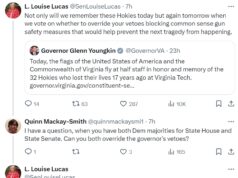![]() This piece begins a discussion that is addressed especially to those who believe that there is no such thing — and can be no such thing — in the world as an “evil force.”
This piece begins a discussion that is addressed especially to those who believe that there is no such thing — and can be no such thing — in the world as an “evil force.”
Summary: Why does that the line from Yeats apply to America in our times? “The best lack all conviction, while the worst / Are filled with a passionate intensity.”
One important reason is that the battle playing out in our politics is fundamentally a moral and spiritual battle, and while the right is connected to their moral and spiritual passions (even though that connection has been made on the basis of lies) Liberal America is not.
Much of that disconnection in Liberal America is due misguided beliefs, including: 1) that “value” is not really real, and 2) that there is nothing in the dynamics of the human world that warrants being called “evil,” an “evil force,” or “the battle between good and evil.”
These beliefs, I will argue, are not only a source of weakness, but also mistaken.
The crucial battle in America today is being fought in the political arena, but the heart of it goes deeper than politics. It is at the moral and spiritual level. The issue in America today is this: will constructive or destructive, life-serving or life-degrading forces prevail in shaping this nation’s future?
The battle to decide this question has not been going well. The lamentable core dynamic of this battle is all too well captured by the line from Yeats: “the best lack all conviction, while the worst / Are filled with a passionate intensity.”
I’ve written (here and “here”) about President Obama’s failure to match the force that has been attacking him relentlessly. But his failure is emblematic of the failure of Liberal America generally.
Why is there this mismatch between the people on the right, inflamed with an insistence on pressing the battle – an insistence that manifests itself, for example, in the repeal of Obamacare some fifty times – while their counterparts in Liberal America show little appetite for the battle?
The heart of the answer to this question about the mismatch lies in that place from which the “passionate intensity” must come in a battle of this sort. That place lies in the core of our humanity from which arise our moral and spiritual passions.
It was such passions that animated leaders in the rise of the Union against the over-reaching dominance of the Slave Power in the 1850s–leaders like Harriet Beecher Stowe and Abraham Lincoln. But so far, this time around, nothing has lit a fire in Liberal America like that lit by Uncle Tom’s Cabin. And Liberal America has not yet raised up a leader like Abraham Lincoln, with moral and spiritual passion deeply integrated into his humanity, fortifying his resolve that, to keep the peace, there was so far he would bend but no further.
In America nowadays, most of the moral and spiritual passion is found on the other side, among those who have been seduced by the “worst” of America’s spirits. Millions of people on the right have been set aflame with the determination to defend their sacred values. Unfortunately, their passionate intensity has been evoked and directed by lies. The picture of the world they have been sold is almost completely false, and the threats against which they have been mobilized to fight are bogus.
Nonetheless, the force on the right has recognized that power in our democracy can be gained through the “passionate intensity” of people who believe see themselves to be engaged in the battle of good against evil.
Much of Liberal America, by contrast, rejects the idea of there being any such thing as “the battle between good and evil.” Those concepts are regarded as the residue of ancient religious ideas that have been rendered obsolete by the advance of a more modern rational and empirical ways of knowing. Committed to the values of intellectual integrity, requiring that conclusions be reached by applying reason to solid evidence, much of Liberal America — certainly not all! — lacks beliefs that provide a solid framework for moral and spiritual passion.
Even the reality of “value” is doubted. What’s real is objective, some of our science-influenced philosophy has declared, and values are not to be found “out there” in our universe. Because values are “subjective,” according to this view, they are but matters of opinion. Nothing can therefore be really good or evil.
This erosion of a sense of the reality of values has been compounded, in the worldview of many, by the removal of the supernatural antagonists, God and Satan. Without such personifications of vast moral and spiritual forces, any notion of forces of “good and evil” embattled in the world seems to many an primitive superstition.
In other words, much of the secular part of Liberal America has cut itself off from the sources of moral and spiritual passion because that has seemed to be required by rationality and intellectual responsibility. Perhaps the false certainties provided by religion can inflame people, according to this point of view. But many of those who see themselves as having moved beyond such false certainties into a better-founded set of beliefs regard the loss of that flame as the cost of seeing things as they truly are.
Although I share the commitment to coming to our beliefs by applying rational processes to the available evidence, I reject all those conclusions.
The evidence at hand — though subtle and complex, but still discernible — can lead us, I will argue, to an understanding that 1) “value” (both positive and negative) is a fundamental part of our reality, and 2) a central dynamic operating in the human world has characteristics that warrant its being called “the battle between good and evil.”

In the upcoming piece “Ideas that Can Make Liberal America Stronger: Value is at the Heart of Our Humanity,” I will substantiate the first of those points.
Then, in “Ideas that Can Make Liberal America Stronger: What Would You Call This, if Not an “Evil Force”?” — and in much of the series to follow — I will show how rational and empirical thinking — in a purely naturalistic framework — can discover a dynamic appropriately called “the battle between good and evil.”
By seeing the deep reality of good and evil, and the battle between them — understood in entirely naturalistic terms — we can tap into a power within us, connect with those passions that empowered our movie heroes — like Luke and Sully and Frodo —


 Sign up for the Blue Virginia weekly newsletter
Sign up for the Blue Virginia weekly newsletter
![Tuesday News: “Johnson gambles on plan separating Israel aid from Ukraine funds”; “It Took One Day for Trump to Get in Trouble at His First Criminal Trial”; “If [Youngkin] wanted to write bills, he should have run to serve in the General Assembly”](https://bluevirginia.us/wp-content/uploads/2024/04/trumptrial-238x178.jpg)







